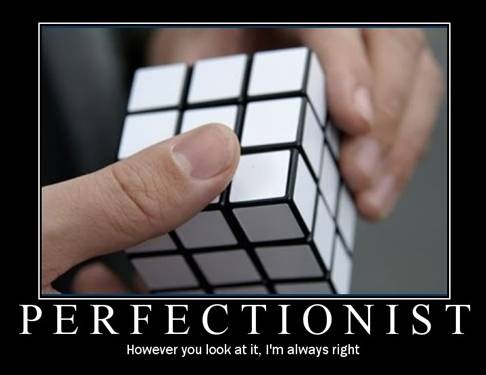
As a life coach promoting happiness, I find myself talking a lot about perfectionism as an obstacle on the way to a happy life. After researching the science of happiness and seeing thousands of clients, including many parents and children, I can tell you that happiness and perfectionism cannot live in the same body. They are like the good and the bad wolves living in your body and when you feed one, the other one starves.
The problem with perfectionism is not only that perfectionists are not happy but also that those who are close to them are not happy either because of it.
Many grownup perfectionists started out as perfectionist kids. In my kids’ assessments, I can tell if a child has a tendency towards perfectionism from age 3. Most people believe this cannot be helped. Some kids are born perfectionists and that is that, but I think this attitude makes our life much harder, because repeating this mantra guarantees there is nothing we can do about it.
Much like any other “disease”, perfectionism can be cured and the best time to do it is during early childhood, before the child develops strong behavior patterns that are hard to change.
I also believe that the best people to cure child perfectionism are parents, because their love for their child will help them overcome the resistance.
The origin of perfectionism is fear. Perfectionists have a strong need to control life around them for some reason. Anything they, or other people, do that threatens that stability or control increases the fear and therefore increases the perfectionism.
Many parents react badly to a child who shows rigid thinking and reacts badly to changes. Unfortunately, that increases the fear and does not give a child the stability he or she is aching for. It is a cycle of bad reactions that helps nobody.

If the parents are perfectionists themselves, they tend not to see the problem at all. Unfortunately, if this is the case, there is no cure. Perfectionist parents must first heal themselves before helping a child overcome perfectionism. After all, to cure perfectionism, there must be a desire to change.
Parents need to find if the child’s behavior is a form of perfectionism, so I have compiled this list to help with that. If you want to assess yourself first, this will be very helpful for you too. To assess yourself, though, you need courage and honesty.
Please remember that for a person to be considered a perfectionist, he or she does not need to exhibit all of the behaviors on the list and does not have to exhibit them all the time, only most of them and more than once or twice.
Here is a list of perfectionist behaviors:
- Perfectionists have high standards for themselves and others. They have high expectations, which are often unreasonable or impossible to achieve.
- Perfectionists pay attention to details. This can be a good thing, but sometimes, after all the important things are covered, they keep focusing on little things.
- Perfectionists have an “all or nothing” mentality. If they cannot do things perfectly, they do not see any point in doing them at all. Many times, people say they have lots of potential, which is true, but if they think they might not be able to achieve their high standard, they do not try.
- Perfectionists procrastinate a lot, which goes together with their high expectations. If they think they will not be able to achieve something, they postpone doing it.

- Perfectionists are afraid to make mistakes, which contributes very much to their anxiety and avoidance.
- Perfectionists have challenges with their relationships. They are very demanding, their behavior makes people avoid their company and in most of their relationships, the blame others and complain.
- Perfectionists are highly competitive and constantly compare themselves to others. They define themselves in comparison to others. Not every competitive person is a perfectionist, so match this with other items on the list.
- Perfectionists seem very unhappy and dissatisfied when good results, good scores and even very good achievements are not good enough. Since they are not perfect, they are no good.
- Perfectionists are very critical.
- Perfectionists show some compulsive behaviors, as they prefer things to be organized, predictable and stable. They need life around them to be consistent and adopt a lifestyle that consists of many routines.
- Perfectionists do not take risks. Risks cannot be predicted by definition and they avoid doing things they cannot predict.
- Perfectionists mainly focus on problems, difficulties and mistakes of themselves and others.
- Perfectionists do a lot to hide their weakness. If someone knows something about a weakness they have, it is a sign for them they are not perfect, which they find hard to accept. They will hide it by having many justifications for their behavior and attitude.
- Although perfectionists may tell others about their mistakes, they do not like it when others tell them about their mistakes and are very sensitive to criticism.
- Perfectionists find it hard to be in the moment. Their mind is so future-oriented they find it hard to stop and enjoy the present.
- Perfectionists are prone to depression.
- Perfectionists consider love as conditional, so they find it hard to feel loved and often find it hard to express love.

- Perfectionists consider things to be “right” or “wrong”. They expect others to think the same and if they do not, they will invest a lot of energy to convince the others their way is the right way.
- Because they have the “my way or the highway” mindset, they can often be seen as self-centered as they expect and demand those around them to fit in with their way of thinking.
Use this list as an assessment tool and measure the intensity of each behavior. Remember that the sooner you discover something, the sooner you can heal it.
Join me next time for how to help perfectionist kids.
Calm and happy parenting,
Ronit
This post is part of the series The Perfect Child:
- The Perfect Child: Is your kid a perfectionist?
- The Perfect Child: How to help perfectionist kids













